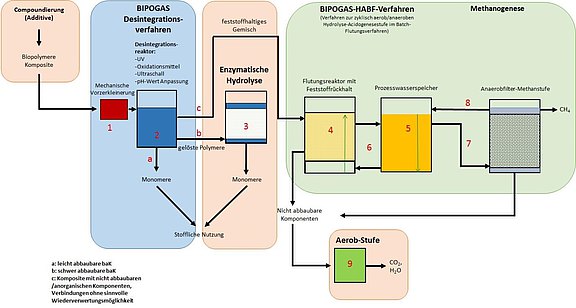Task
The aim of the project was to develop a flexible, multi-stage and efficient process for the material and energy recovery of waste from biodegradable plastics (baKs) - the so-called "BIPOGAS/BIOPOGAS process".
Depending on the quality and purity of the biodegradable plastics, the process enables either material recycling (monomers for re-polymerisation) or energy recovery from the degradation products in the form of biogas. This can then be converted into electricity and heat in a CHP unit.
Finally, an aerobic stage is implemented in the overall process to break down unreacted starting materials. The priority of the process approach is energy recovery followed by direct material recovery.
Results
The development of the anaerobic process for the methanisation of biodegradable biopolymers such as PLA, PHB and others was successfully implemented. It could be proven that with the applied disintegration process as well as the developed anaerobic process, degradation degrees to methane with over 90% (for PLA) with a stable process flow and economically relevant throughput can be achieved. The economic marketing of the process is thus possible and also realistic.
The general feasibility of the repolymerisation of PLA could be demonstrated on a laboratory scale. Here, further investigations must show the advantage of closing the value chain of PLA via a final and ultimate use of the polymer to a possible material cycle and thus represent a strong alternative to purely energetic conversion.
Application
The planned development is a further step away from petroleum-based to renewable raw materials. The process can be a solution to the frequently discussed and partly negative properties (interfering substances in composting plants, no raw material or efficient energy use, poor life cycle assessment, etc.) of baKs.
